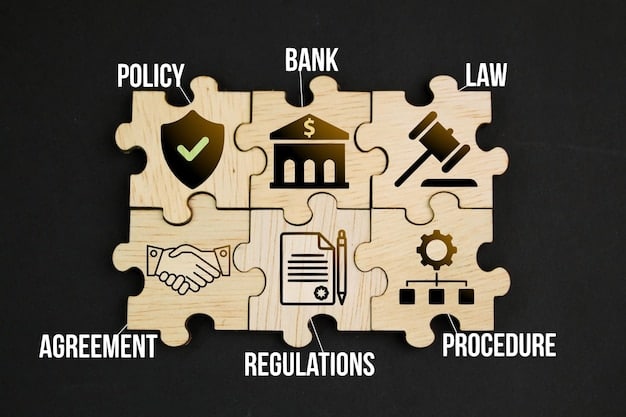Estate Planning: Secure Your Future & Protect Loved Ones

Estate planning is crucial for protecting your assets, ensuring your wishes are honored, and providing for your loved ones’ financial security and well-being after your passing.
The Importance of Estate Planning: Protecting Your Assets and Your Loved Ones cannot be overstated in today’s complex world. It’s about ensuring your wishes are respected and your family is secure.
Why Estate Planning Matters: Securing Your Family’s Future
Estate planning is often seen as something only the wealthy need to consider, but this is far from the truth. It’s a proactive approach to managing your assets and ensuring your loved ones are taken care of, regardless of the size of your estate.
This process involves creating a legal framework outlining how your assets will be distributed, who will care for your dependents, and how your medical and financial decisions will be handled if you become incapacitated.
Protecting Your Assets
One of the primary benefits of estate planning is asset protection. Without a proper plan, your assets may be subject to unnecessary taxes, legal fees, and delays in probate court.
Ensuring Your Wishes Are Honored
Estate planning allows you to dictate exactly how your assets are distributed. This eliminates ambiguity and potential family disputes, ensuring your intentions are accurately carried out.
- Having control over your assets.
- Avoiding unnecessary taxes by planning
- Guaranteeing your family’s future.
In conclusion, estate planning is essential for everyone, not just the wealthy. It offers peace of mind, knowing your affairs are in order and your loved ones will be protected.
Understanding Wills and Trusts: Key Components of Estate Planning
Wills and trusts are two fundamental tools used in estate planning. While they both serve to transfer assets, they operate differently and offer distinct advantages. Choosing the right tool depends on your specific circumstances and goals.
Understanding the nuances of wills and trusts is crucial for creating a comprehensive estate plan tailored to your needs.

Wills: The Foundation of Estate Planning
A will is a legal document that outlines how your assets will be distributed after your death. It also allows you to name guardians for minor children and designate an executor to manage your estate.
However, wills typically go through probate, a court-supervised process that can be time-consuming and costly.
Trusts: A Flexible Alternative
A trust is a legal arrangement where you (the grantor) transfer assets to a trustee, who manages them for the benefit of your beneficiaries. Trusts can avoid probate and offer greater control over asset distribution.
There are various types of trusts, each with its own unique features and benefits, such as revocable living trusts and irrevocable trusts.
- Wills are very common, but have a probate.
- Trusts can control your asset allocation.
- Trusts may incur extra costs.
Carefully consider your assets, family dynamics, and long-term goals when deciding whether a will, a trust, or a combination of both is the right choice for your estate plan.
The Role of Beneficiary Designations: Streamlining Asset Transfer
Beneficiary designations are an often-overlooked but critical aspect of estate planning. They allow you to directly transfer specific assets to your chosen beneficiaries, bypassing the probate process.
Understanding how beneficiary designations work and ensuring they are up-to-date is essential for a streamlined and effective estate plan.
Assets That Allow Beneficiary Designations
Certain assets, such as life insurance policies, retirement accounts (401(k)s, IRAs), and investment accounts, allow you to designate beneficiaries who will receive these assets directly upon your death.
Reviewing and Updating Beneficiary Designations
It’s crucial to regularly review and update your beneficiary designations, especially after major life events like marriage, divorce, birth of a child, or death of a beneficiary. Outdated designations can lead to unintended consequences.
- Beneficiary designations speed up inheritance.
- Most assets have beneficiary designations.
- It is important to keep designations updated to avoid legal issues.
In summary, beneficiary designations are a powerful tool for simplifying asset transfer and ensuring your assets are distributed according to your wishes. Keeping these designations current is a key element of sound estate planning.
Navigating Incapacity: Planning for Medical and Financial Decisions
Estate planning isn’t just about what happens after you die; it also addresses what happens if you become incapacitated and unable to make decisions for yourself. Planning for incapacity is a crucial aspect of protecting your well-being and ensuring your affairs are managed according to your wishes.
This involves creating legal documents that grant someone you trust the authority to make medical and financial decisions on your behalf.
Durable Power of Attorney: Financial Management
A durable power of attorney allows you to appoint an agent to manage your financial affairs if you become incapacitated. This agent can pay bills, manage investments, and make other financial decisions on your behalf.
Healthcare Proxy: Medical Decisions
A healthcare proxy (also known as a medical power of attorney) allows you to appoint someone to make medical decisions for you if you are unable to do so. This person can access your medical records and consent to medical treatment on your behalf.

Appointing trusted individuals to act as your agents in these documents ensures your medical and financial affairs will be handled according to your preferences if you become incapacitated. Planning allows peace of mind for the future.
Minimizing Estate Taxes: Strategies for Preserving Your Wealth
Estate taxes can significantly reduce the value of your estate, potentially diminishing the inheritance your loved ones receive. Effective estate planning involves strategies to minimize or eliminate these taxes, preserving your wealth for future generations.
Understanding estate tax laws and implementing appropriate strategies can make a substantial difference in the amount of assets your beneficiaries receive.
Understanding Estate Tax Thresholds
Estate taxes are levied on the value of your estate above a certain threshold, which varies depending on federal and state laws. Staying informed about these thresholds is crucial for tax planning.
Gift-Giving Strategies
Gifting assets during your lifetime can reduce the size of your taxable estate. The annual gift tax exclusion allows you to gift a certain amount each year without incurring gift tax.
- Look for ways to minimize taxes to preserve wealth
- Use gifts as a way to minimize taxes.
- Understand what tax thresholds apply to your estate.
By carefully planning and implementing tax-minimization strategies, you can maximize the value of your estate and ensure your loved ones receive the full benefit of your legacy.
The Importance of Regular Review and Updates: Adapting to Life Changes
Estate planning is not a one-time event; it’s an ongoing process that requires regular review and updates. Life changes, such as marriage, divorce, birth of a child, or changes in financial circumstances, can significantly impact your estate plan.
Keeping your estate plan current ensures it continues to reflect your wishes and effectively addresses your evolving needs.
Life Events That Trigger Updates
Major life events, like those mentioned above, should prompt a review of your estate plan. Additionally, changes in tax laws or state laws may necessitate adjustments to your plan.
Working with an Estate Planning Attorney
An experienced estate planning attorney can help you navigate these changes and ensure your estate plan remains effective. They can provide guidance on the latest legal and tax developments and tailor your plan to your specific needs.
- Life changes require updates to plans.
- Work with an expert.
- Check tax and state laws.
By committing to regular review and updates, you can ensure your estate plan remains a valuable tool for protecting your assets, supporting your loved ones, and achieving your long-term goals.
| Key Point | Brief Description |
|---|---|
| 🛡️ Asset Protection | Safeguarding wealth from taxes and legal fees. |
| 📜 Wills and Trusts | Tools for asset transfer and distribution control. |
| ✍️ Beneficiary Designations | Streamlining asset transfer outside of probate. |
| 🩺 Incapacity Planning | Ensuring medical and financial decisions managed. |
Frequently Asked Questions
▼
Estate planning is the process of arranging for the management and distribution of your assets in the event of your death or incapacitation, ensuring your wishes are carried out.
▼
Anyone who owns assets or has dependents should have an estate plan. It’s not just for the wealthy. It protects everyone regardless of their wealth status.
▼
Common components include a will, trust, power of attorney, healthcare proxy, and beneficiary designations, which define how assets are transferred and decisions are managed.
▼
You should review it every three to five years or sooner after a major life event such as marriage, divorce, birth of a child, or significant change in assets.
▼
While it’s possible to do so, consulting with an estate planning attorney is highly recommended to ensure your plan is legally sound and tailored to your specific needs and circumstances.
Conclusion
In conclusion, the importance of estate planning: protecting your assets and your loved ones is a cornerstone of responsible financial stewardship. It offers peace of mind and security, knowing that your affairs are in order and your family will be protected. By taking the time to create and maintain a comprehensive estate plan, you are making a lasting investment in your family’s future.





